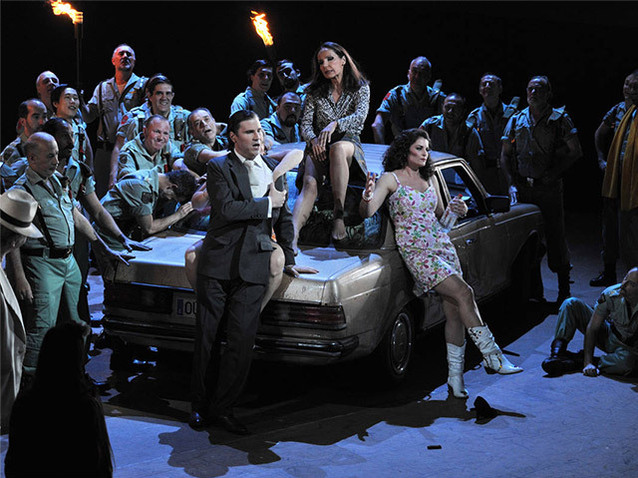 © DR
© DR
In Barcelona, Carmen always comes as a balm for the arks of a theatre that is constantly in a financial crisis. Carmen is a comfortable title, it gets a full house, and this was not an exception.
It was presented in the "outrageous" version by Calixto Bieito, originally created for the Festival of Peralada, which has been running around the world for 15 years, conveniently adapted, with a significant success. It is a difficult, risky production.
Carmenis a fleshy, wild, violent opera, an intense, brutal and rude story about sex, desire and freedom, and about the impossibility of combining them with life in society. Bieito approached it from this perspective, without sparing any detail, no matter how harsh. Some of its elements are arguable. Was it necessary to feature a naked dancer in the moonlight moving as a bullfighter during the prelude to the 3rd act? No, it wasn't, but it provided a beautiful and dramatically powerful scene. Was it necessary, at Lila Pastia's tavern, for Carmen to take off her knickers and sit on Don José lying on the floor in order to seduce him to stay with her? No, it wasn't, but it remained perfectly coherent with this setting and the character we had been presented with.
This production pushes the text and the situations to its boundaries, but it doesn't betray the dramatic essence. It is not a set in stone version of the opera, it only presents an option, a valid, powerful and pertinent option.
Musically, the opening performance remained seemly but didn't attain much. Béatrice Uria-Monzón, who has sung in this production many times, is ever more comfortable with the role of Carmen, although she appears increasingly less comfortable with a score which she is starting to struggle with. The vocal line was appropriate but lacked the sensuality and the intensity which she was indeed capable of bringing to the theatrical side of the character.
Don José, the Austrian tenor Nikolai Schukoff, slightly forced the voice at the beginning and the timbre was unstable. The 'pearl' of the role, the aria "La fleur que tu m'avais jetée", was convincing, although he was not able to end in a subtle pianissimo on the B flat. However, he arrived bravely to the final scene, which was probably his best moment.
Escamillo, the baritone Massimo Cavalletti, was vocally only sufficient in his debut at the Liceu, and dramatically scarcely persuasive. In the famous "couplets", rather flamboyant than powerful, he delivered the role without great splendour.
Evelin Novak, who also debuted at the Liceu gave large vocal power to the role of Micaëla, although being somehow unfocused scenically at times. In proportion, she was the most acclaimed performer of the night.
The remaining secondary characters were correct and the choir was outstanding.
The responsible for the musical direction was the young Latvian conductor Ainars Rubikis, another debutant at the Liceu. His work was effective, not brilliant. He adjusted properly with the soloists but the big choral numbers didn't fit very smoothly with the orchestra and drifted dangerously in general.
by Xavier Pujol
Carmen at 17, 20, 23, 26 and 29 April 2015 and 2 May 2015 at the Gran Teatre del Liceu, Barcelona
the 29 of March, 2021 | Print
Comments